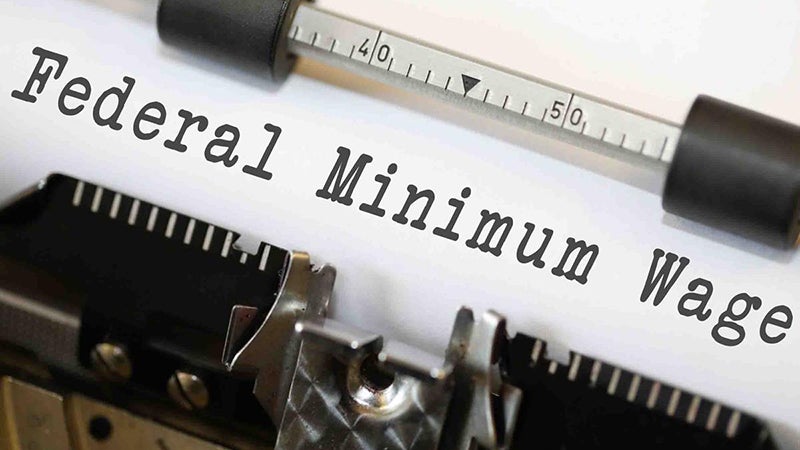Business owners speak as Congress debates wage hike
Published 4:17 pm Friday, July 12, 2019
The federal minimum wage, which currently sits at $7.25 per hour, has not been increased in a decade, meaning that today’s worker has less buying power than a minimum wage worker in the 1960s had.
In an effort to tackle that problem, the U.S. House of Representatives is poised to take up legislation, known as the Raise the Wage Act of 2019, as early as next week and Rep. Terri Sewell, D-AL, is among the lawmakers committed to supporting the bill.
“Hardworking Alabamians deserve a raise,” Sewell said. “Democrats stand united in their belief that the current federal minimum wage of $7.25 per hour is not enough for Americans to make ends meet, no matter where they live or work. I am committed to keeping our promise to raise the minimum wage for the American people and Alabamians who have been left behind by our legislature’s refusal to raise the statewide minimum wage.”
Sewell noted that in her district, Alabama’s Seventh Congressional District, more than 45 percent of workers could be affected by the legislation, which would help “families make ends meet” and boost “economic growth by putting money in the pockets of workers who will spend it in their communities.”
The bill comes on the heels of a report from the nonpartisan Congressional Budget Office, which found that as many as 27 million Americans would see a wage increase as a result of the legislation and about 1.3 million would be lifted out of poverty.
The report was not without its drawbacks, finding that around 1 million jobs might be lost as a result of the increase, though it noted that as many as 3 million or as few as zero might be lost.
The bill calls for the minimum wage to be increased to $15 an hour over the next five years and indexes future increases to median wage growth to ensure that the minimum wage does not fall below levels necessary for basic sustainability – currently, according to Business Insider, a minimum wage worker would have to work three jobs to afford a two-bedroom apartment; according to the National Low Income Housing Coalition, a full-time employee in Alabama – 40 hours per week, 52 weeks per year – would have to earn $14.92 per hour to afford a two-bedroom rental home.
The bill would also repeal the subminimum wage for tipped workers and require employers to pay these workers the federal minimum wage.
For his part, U.S. Sen. Doug Jones, D-AL, is on board with raising the minimum wage, though he is skeptical that Senate Majority Leader Mitch McConnell, R-KY, will allow it to come before the Republican-controlled Senate for a vote once it clears the Democrat-controlled House.
“I think that we need to make some adjustments to the minimum wage, it’s been stagnant now for 10 years,” Jones said during a press call earlier this week. “Things have changed and our wages in Alabama and elsewhere…have not been growing like they should be.”
Jones noted that many people are not feeling the impact of a thriving economy, saying that most people’s living expenses come from paychecks and not from stock portfolios and dividend checks.
“We need to look at an adjustment in the minimum wage at this point to help people who are working minimum wage or just above minimum wage jobs and, in some cases, working two jobs to continue to make ends meet,” Jones said. “The minimum wage is still low and with housing costs the way they are, food costs the way they are, it is tough to get by on minimum wage these days, especially if you have a family.”
For her part, Jackie Smith, Owner of The Coffee Shoppe on Broad Street, is on board with the proposed hike, noting that her employees are already making $9 per hour on average.
“I would support this,” Smith said of the bill. “Personally, I feel my employees deserve it and I wish I was in a position to pay it now. If it is implemented in phases over the next five years, that would allow me time to analyze and assess operations and get creative.”
Smith, who currently has one full-time employee and three part-time workers, knows that an increase in the minimum wage would come with its own drawbacks – she noted that some of the new cost of paying a living wage would have to be passed on to consumers and it’s possible that she would be forced to reduce staff – but still believes a raise is needed for the nation’s low-wage workers.
“I can’t speak against increasing [the] minimum wage when the cost of everything else is skyrocketing,” Smith said. “The cost of utilities, groceries, gas, medicine is the same for everybody. I see it every day where people have to choose between the power bill and their medicine.”
Mark Woodson, Owner of Selma’s KFC, currently employs around 50 people and believes a hike like the one proposed in the House legislation would be a death sentence for small business owners, though he wouldn’t say whether or not he supported the increase.
“It would be very hard on small businesses,” Woodson said. “Some just aren’t equipped to handle that.”
Woodson said that, along with an increase in the cost of paying workers, the payroll tax would stick business owners with a second cost for labor that would lead to an increase in the cost of services or products.
“Nobody gets more money,” Woodson said. “It puts more money into the system, but it’s not going to make anything any better.”
Additionally, Woodson was concerned about the rate of the increase, which would nearly double the minimum wage over the next half decade.
“To double minimum wage is going to suck up the value of a dollar,” Woodson said.
For his part, he believes a more modest approach to increasing the minimum wage, perhaps to $9 an hour, would be a good place to start.






